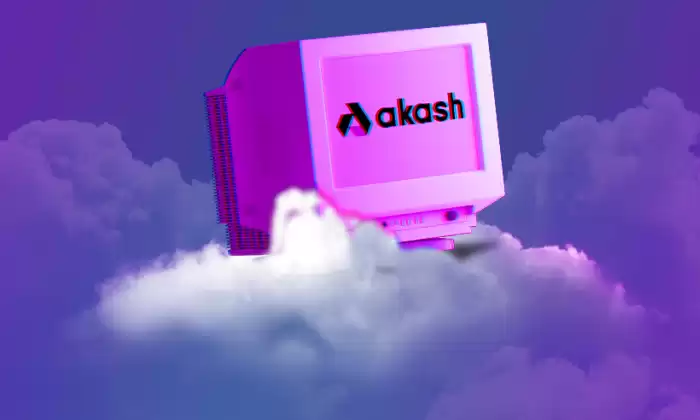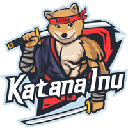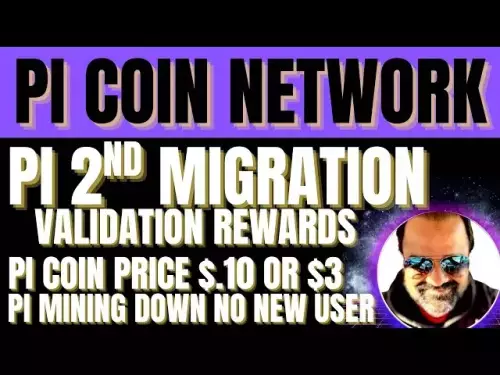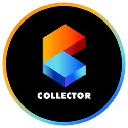-
 bitcoin
bitcoin $109523.663807 USD
-0.13% -
 ethereum
ethereum $4019.526508 USD
2.06% -
 tether
tether $1.000482 USD
0.00% -
 xrp
xrp $2.776815 USD
0.18% -
 bnb
bnb $958.942396 USD
0.12% -
 solana
solana $204.294698 USD
3.84% -
 usd-coin
usd-coin $0.999693 USD
0.00% -
 dogecoin
dogecoin $0.232115 USD
2.09% -
 tron
tron $0.338028 USD
0.84% -
 cardano
cardano $0.790920 USD
1.50% -
 hyperliquid
hyperliquid $44.871443 USD
5.60% -
 ethena-usde
ethena-usde $1.000322 USD
0.04% -
 chainlink
chainlink $21.034165 USD
2.60% -
 avalanche
avalanche $28.794831 USD
-0.54% -
 stellar
stellar $0.360466 USD
1.24%
What is Akash coin
Akash Network revolutionizes cloud computing with its decentralized and transparent platform, offering cost-effective, secure, and reliable computing resources.
Nov 18, 2024 at 01:30 pm

What is Akash Coin?
Akash Network is a decentralized, open-source cloud computing platform that enables users to buy and sell computing resources in a secure, transparent, and cost-effective manner. It utilizes blockchain technology to create a marketplace where cloud service providers can offer their resources, and users can access them without relying on centralized intermediaries.
Key Features of Akash Network
- Decentralization: Akash Network is not controlled by any single entity, eliminating the risks associated with traditional cloud computing providers.
- Transparency: All transactions and pricing information is recorded on the blockchain, providing full transparency and accountability.
- Cost-effectiveness: Akash Network allows users to access computing resources at significantly lower costs compared to traditional cloud platforms.
- Security: The network utilizes advanced cryptographic techniques to protect user data and ensure the integrity of transactions.
- Reliability: Akash Network is designed to be highly reliable, with built-in redundancy and failover mechanisms to prevent downtime.
How Akash Network Works
Akash Network operates as a two-sided marketplace, connecting cloud service providers with users in need of computing resources. The process involves the following steps:
- Service Providers Join the Network: Cloud service providers can join the Akash Network by registering their resources on the blockchain. They specify the type of resources offered, their availability, and their pricing.
- Users Discover and Request Resources: Users searching for computing resources can browse the marketplace, compare pricing and availability, and request the resources they need.
- Bidding and Allocation: Providers bid on user requests based on their available capacity and the specified pricing. The auction-based system automatically allocates resources to users based on the best bids.
- Billing and Payment: Once resources are allocated, users are billed for their usage in Akash tokens (AKT). Payments are processed through the blockchain, ensuring secure and transparent transactions.
- Dispute Resolution: In case of any issues or disputes between users and providers, an automated dispute resolution system is triggered to resolve the matter fairly.
Benefits of Using Akash Network
- Reduced Costs: Akash Network enables users to save up to 80% on cloud computing costs compared to traditional providers.
- Flexibility and Scalability: Users can access a diverse range of computing resources from multiple providers, allowing them to scale their applications up or down as needed.
- Enhanced Security: Decentralization and blockchain technology protect user data from unauthorized access or manipulation.
- Transparency and Control: Users have full transparency into pricing, availability, and transaction history, empowering them to make informed decisions.
- Sustainability: Akash Network aims to promote sustainable cloud computing by optimizing resource utilization and minimizing the environmental impact.
Disclaimer:info@kdj.com
The information provided is not trading advice. kdj.com does not assume any responsibility for any investments made based on the information provided in this article. Cryptocurrencies are highly volatile and it is highly recommended that you invest with caution after thorough research!
If you believe that the content used on this website infringes your copyright, please contact us immediately (info@kdj.com) and we will delete it promptly.
- Ethereum Price Crash Concerns: Navigating the Volatility
- 2025-09-27 16:45:11
- Bitcoin's Bull Flag and FVG: Decoding the Crypto Crystal Ball
- 2025-09-27 16:25:14
- Ozak AI's $OZ Token: Riding the AI & Blockchain Profit Surge
- 2025-09-27 16:25:14
- Remittix Token Presale: CertiK Verification and PayFi Innovation
- 2025-09-27 16:30:00
- XRP Chart Signal Sparks Price Rally Buzz: Is a Breakout Imminent?
- 2025-09-27 16:45:11
- Vitalik, Chat Control, and Privacy Security: A Balancing Act
- 2025-09-27 16:30:00
Related knowledge

What is Ethereum’s Slashing mechanism and how to punish malicious behavior?
Feb 20,2025 at 03:08am
Key PointsOverview of slashingDifferent types of slashing in EthereumIncentives and consequences of slashingIdentifying and reporting slashed validato...

What is the verifier node of Ethereum and how to become a verifier?
Feb 19,2025 at 06:00pm
The Verifier Node of Ethereum: A Comprehensive GuideKey Points:What is a Verifier Node?How to Become a Verifier NodeResponsibilities and Rewards of a ...

What is Ethereum’s staking, and how to participate and earn money?
Feb 19,2025 at 04:37pm
Key Points:Understanding Ethereum's Staking MechanismSteps to Participate in StakingBenefits and Rewards of StakingSecurity and Risk ConsiderationsTec...

What is Ethereum’s DAO (Decentralized Autonomous Organization) and how does it work?
Feb 20,2025 at 03:12am
Key PointsDefinition and Structure of a DAOGovernance and Decision-Making in DAOsBenefits and Use Cases of DAOsChallenges and Limitations of DAOsWhat ...

What is Ethereum's multi-signature wallet and how to improve security?
Feb 20,2025 at 02:18pm
Key Points:Understanding the Concept of a Multi-Signature WalletBenefits and Drawbacks of Multisig WalletsRequirements for Setting Up a Multisig Walle...

What is Ethereum's oracle and how to provide data for smart contracts?
Feb 21,2025 at 01:30am
Key Points:Understanding the concept of oracles in EthereumExploring different types of oraclesDetailed guide on how to provide data for smart contrac...

What is Ethereum’s Slashing mechanism and how to punish malicious behavior?
Feb 20,2025 at 03:08am
Key PointsOverview of slashingDifferent types of slashing in EthereumIncentives and consequences of slashingIdentifying and reporting slashed validato...

What is the verifier node of Ethereum and how to become a verifier?
Feb 19,2025 at 06:00pm
The Verifier Node of Ethereum: A Comprehensive GuideKey Points:What is a Verifier Node?How to Become a Verifier NodeResponsibilities and Rewards of a ...

What is Ethereum’s staking, and how to participate and earn money?
Feb 19,2025 at 04:37pm
Key Points:Understanding Ethereum's Staking MechanismSteps to Participate in StakingBenefits and Rewards of StakingSecurity and Risk ConsiderationsTec...

What is Ethereum’s DAO (Decentralized Autonomous Organization) and how does it work?
Feb 20,2025 at 03:12am
Key PointsDefinition and Structure of a DAOGovernance and Decision-Making in DAOsBenefits and Use Cases of DAOsChallenges and Limitations of DAOsWhat ...

What is Ethereum's multi-signature wallet and how to improve security?
Feb 20,2025 at 02:18pm
Key Points:Understanding the Concept of a Multi-Signature WalletBenefits and Drawbacks of Multisig WalletsRequirements for Setting Up a Multisig Walle...

What is Ethereum's oracle and how to provide data for smart contracts?
Feb 21,2025 at 01:30am
Key Points:Understanding the concept of oracles in EthereumExploring different types of oraclesDetailed guide on how to provide data for smart contrac...
See all articles










































































